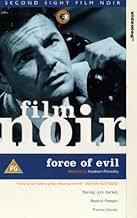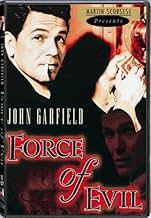Un avvocato senza etica che vuole aiutare suo fratello maggiore diventa socio di un suo cliente in un numero di truffe.Un avvocato senza etica che vuole aiutare suo fratello maggiore diventa socio di un suo cliente in un numero di truffe.Un avvocato senza etica che vuole aiutare suo fratello maggiore diventa socio di un suo cliente in un numero di truffe.
- Regia
- Sceneggiatura
- Star
- Premi
- 4 vittorie totali
- Freddie Bauer
- (as Howland Chamberlin)
- Comptroller
- (non citato nei titoli originali)
- Sorter
- (non citato nei titoli originali)
- Sylvia Morse
- (non citato nei titoli originali)
- Sorter
- (non citato nei titoli originali)
- Detective
- (non citato nei titoli originali)
- Mother
- (non citato nei titoli originali)
- Attorney
- (non citato nei titoli originali)
Recensioni in evidenza
John Garfield is brilliant as the charming, amoral lawyer Joe Morse, a Mr Fixit for racket-boss Ben Tucker (Roy Roberts). Thomas Gomez plays Joe's sick, world-weary brother Leo, who also runs an illegal numbers game, but independently of the mob, in an honorable and decent fashion. Some of the best scenes in the film show Joe trying, as he sees it, to help Leo by bringing him into Tucker's operation, while Leo resists and berates Joe for using his ability and education in such an ignoble cause. Much of this intense dialogue is reminiscent of that in plays by Clifford Odets or Arthur Miller.
Also compelling, but with a lighter feel, are scenes between Joe and Doris (Beatrice Pearson) a quiet but assured young woman who works for Leo. Joe adopts slick patter, and runs himself down, in an attempt to gain her sympathy. Also in the movie, but with a disappointingly small part, is Marie Windsor, as Edna, Tucker's wife; in a longer, more commercial, film, her role of femme fatale would almost certainly have been expanded.
But it is the sets, location work, cinematography and editing which lift the film above the average. Practically every scene and shot has visual interest, and it is definitely one film you want to go on longer than its allotted 80 minutes.
Of course the fact that the film was shot totally on location in scintillating black and white noir in New York City, gave it a dimension that no other noir films have, save possibly Night and the City which was also shot on location in London.
John Garfield who was as quintessential a New Yorker as you could get plays Joe Morse, smooth lawyer for a big time racketeer Roy Roberts who is looking to either take over or muscle out the small time policy banks in the numbers racket. One of those banks is owned by Garfield's brother, Thomas Gomez.
Garfield is as ruthless as Roberts, but with a velvet glove. He tries to get Gomez to go along with the syndicate, but Gomez balks. There's also a prosecutor looking into the numbers racket and a tapped phone which figures prominently in the climax.
Given the leftwing polemics of both the star and director Abraham Polonsky, Force of Evil got the attention of the ultra rightwing House Un American Activities Committee. Polonsky was blacklisted for over 20 years and Garfield died under the strain of the investigation.
Given what has happened to the Soviet Union, I wonder if Garfield and Polonsky were alive today what they would say and how they would feel about their work here. It's interesting to speculate.
But as entertainment Force of Evil is a great success and that is the first rule of film. Also look for a good performance by Marie Windsor as Roberts's wife with a yen for Garfield. One of her first femme fatale roles and one of her best.
The plot which unfolds is a terse, melodramatic thriller notable for realist location photography, almost poetic dialogue and frequent biblical allusions (Cain and Abel, Judas's betrayal, stigmata).
What I really liked about this film is how it portrays the numbers racket. Whoever wrote this clearly knew what he was talking about. As someone who has studied the Mafia and its activities, I have a pretty good idea of how the numbers business works and how it can (or cannot) be rigged. These concerns are addressed in a very knowledgeable way.
The character of Leo, superbly played by Thomas Gomez, is inherently honest and noble but he must live and work in the naturally shady numbers racket. He knows that he will be eventually crushed. This knowledge makes Leo one of the most bitter and tragic characters in film...a decent man whose life is dominated by futility.
The protagonist of the film, portrayed by John Garfield, is Leo's brother. He has ridden his job as a sleazy mob lawyer to a life of fame and ease. He has everything Leo doesn't. Yet despite his blustery banter, he,too,is uneasy with his position. He knows Leo is headed for disaster and pulls all the strings he can to protect him, even though Leo reacts to him with contempt. Their relationship is doomed by the corrupt methods both use to survive. Garfield's character finds redemption of a sort by the film's end but not before inevitable tragedy has struck.
There are many more levels to this complex film and discussion of them all could fill many pages. Above all, it is a beautiful movie,expertly directed with tremendous black and white imagery. The dialogue combines snappy patter with almost poetic sensibility. And the performances of all concerned are top notch. This is truly a treasure of cinematic art. Be prepared to think deeply when you watch it
But a few differences help cast a light on what this is:
- the protagonist is not a gumshoe unraveling a case or hapless schmuck crushed by the fates. He's a cocky narrator, as much in control of what happens as anyone else, and in on it from the start. He has the usual fast-talking bravado, he glides smoothly, sweeps the girl off her feet. And yet his real impetus is wanting to pay back a big brother who sacrificed to get him out of tenement life.
- the girl is not some world-savvy dame but a sweet, innocent soul who instinctively backs out of the racket when it starts to feel wrong and is ready to fall for him only tentatively, guarding herself as she gives way.
All through this New York looks gritty rather than sultry, the narrative light is harsh and anxious. The contrast is between not entirely legal but not entirely immoral slum life, and the new cut-throat world of big business coming for the little guy. It's a bit of stretch to show the smalltime hustlers as the personable 'good guys' but that's the short-hand used. Its real progenitors are gangster films.
- And third, there is a scheme underway that resolves all this, to turn a numbers racket run piecemeal from tenement backrooms into a respectable, lucrative business run from Wall Street.
There's a lot of talk throughout, in that rat-tat-tat fashion of Hollywood. The dialogue verges on histrionic, and the whole has a verbose feel, but one that feels like someone has studied this life and is trying to come back with an honest depiction. It has a thickness of world to it, although the mannerisms are obvious.
Here's the cinch and what probably earned the movie a reputation as left-wing and landed the filmmaker in the famous HUAC blacklist.
The scheme works, the older brother eventually goes along with it, who had earlier made a big moral stand against it. The girl is swept off her feet. Our guy stands to make a fortune, help his brother, and get the girl who is not a dame like his boss's wife.
Except, in unchecked capitalism no one is really in control. Police had been watching but it's the nerve-wracked bookkeeper who sets the scene for grievous consequences to follow. The moral resolution is that it works but at what price to the soul; the lesson remains that a life of scheming doesn't pay and I'm not bowled over in this case.
Even more pertinently however, were the smalltime hustlers a boon to their community? They were running much the same lottery, working peoples' money for the promise that maybe this week it'll be you. But it seems there were bonds of community which the merger frays and disturbs. You'll see that it's our hero's tie to a human story rooted in community that really foils the plan.
The evocative finale with the couple descending stairs with the Brooklyn Bridge hulking above them is a favorite. In fact my favorite bits here all revolve around these two and their unlikely bond, their playful interplay against the larger background.
Lo sapevi?
- QuizIn order to show cinematographer George Barnes how he wanted the film to look, Abraham Polonsky gave him a book of Edward Hopper's Third Avenue paintings.
- BlooperDuring a climactic montage set at an East Coast racetrack on the Fourth of July, people in the stock footage crowd scenes are dressed in winter garments nobody would wear in the middle of summer.
- Citazioni
[after Joe bails his brother, Doris and the others out of jail]
Doris Lowry: You know I've got my whole life to think about now and you won't be of any help.
Joe Morse: How do you know? You know everything I touch turns to gold. It's raining out and I promised my brother to take you home.
Doris Lowry: Well, that's a lie.
Joe Morse: Well, it's not true; but I would have had he asked. You know you can't tell about your life 'til you're all through living it. Come on, I'll give you a lift. You're tired, I'm tireder. What can happen to either one of us? You tell me the story of your life and maybe I can suggest a happy ending.
- Versioni alternativeAll existing copies of the film are of the version that was cut by 10 minutes in order to fit into a double bill.
- ConnessioniEdited into American Cinema: Film Noir (1995)
I più visti
- How long is Force of Evil?Powered by Alexa
Dettagli
- Data di uscita
- Paese di origine
- Siti ufficiali
- Lingua
- Celebre anche come
- Force of Evil
- Luoghi delle riprese
- Aziende produttrici
- Vedi altri crediti dell’azienda su IMDbPro
Botteghino
- Lordo Stati Uniti e Canada
- 948.000 USD
- Lordo in tutto il mondo
- 1.165.000 USD
- Tempo di esecuzione
- 1h 19min(79 min)
- Colore
- Proporzioni
- 1.33 : 1





































